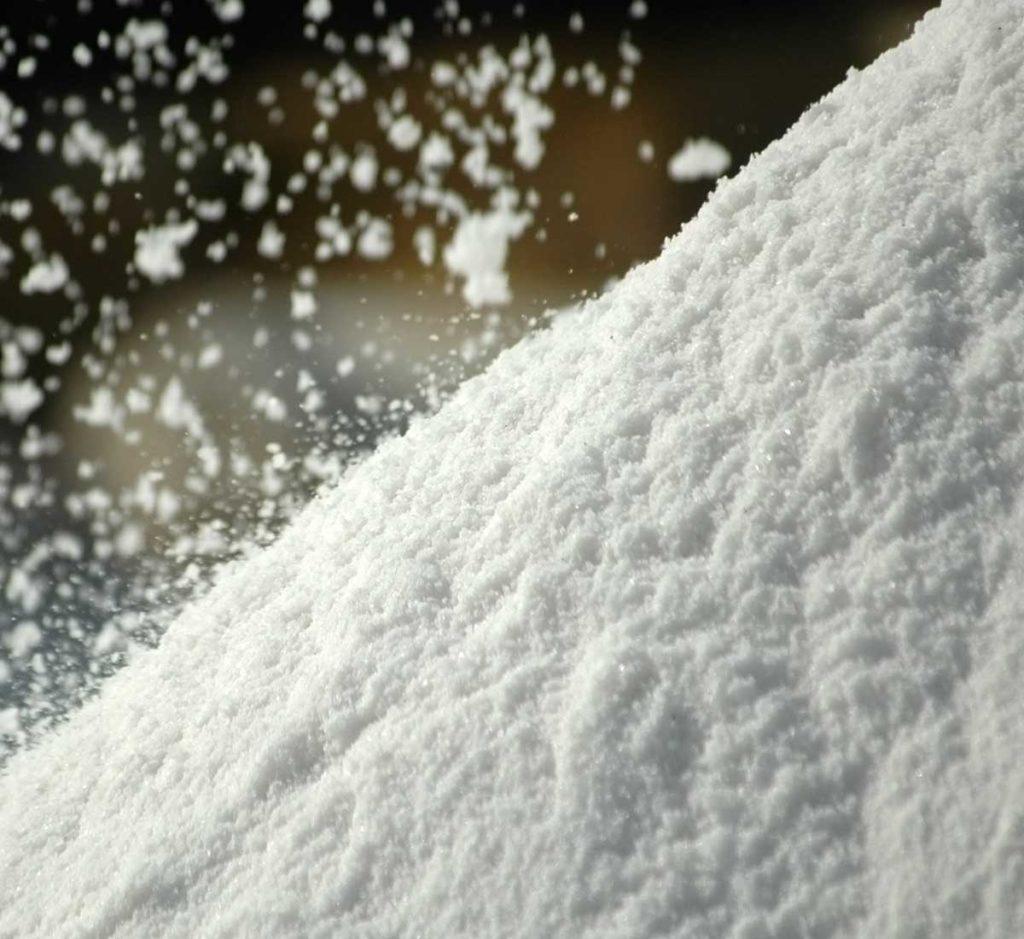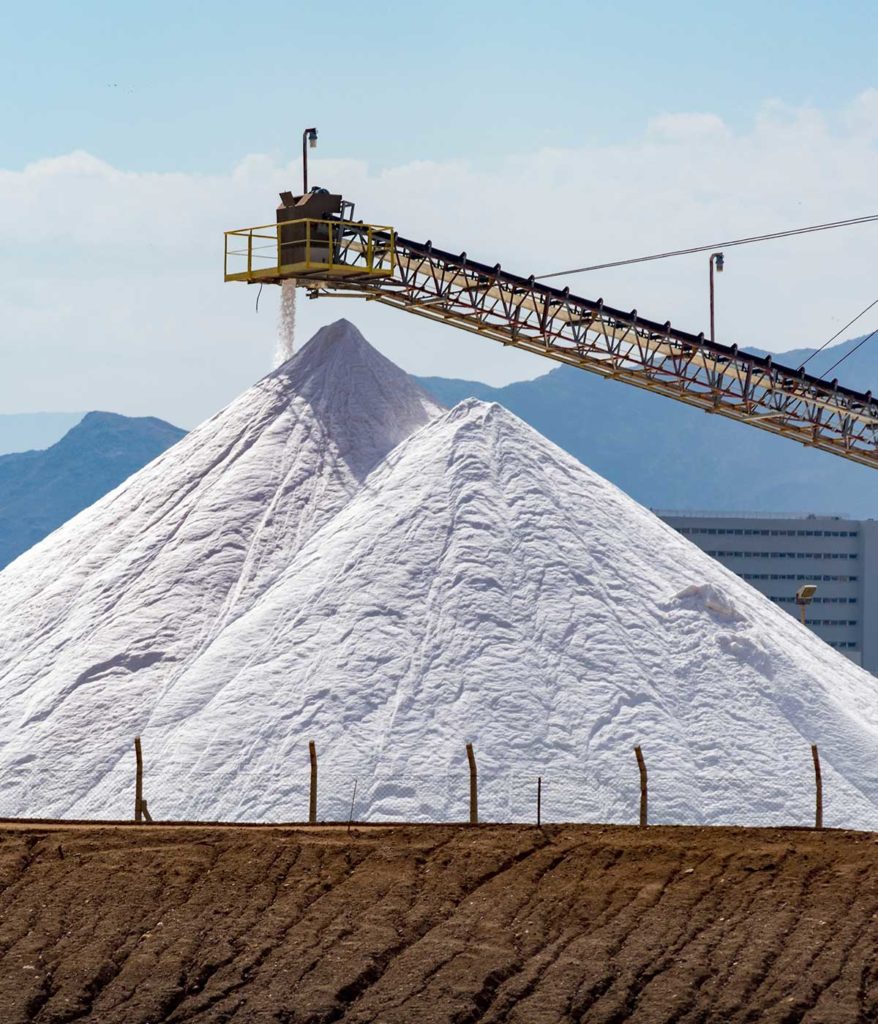Evaporated salt
Evaporated salt is among the most common forms of table salt. As a traditional wholesaler, August Töpfer & Co. attaches great importance to the quality of our salt products. Discover our certified range now.
What is evaporated salt?
Evaporated salt is one of the three main categories of saltthat differ in terms of how and where they are extracted. These three categories are sea salt, rock salt and evaporated salt. Technically, all industrial and table salt originates from Sea salt in one way or another. Sea salt is extracted from the salt layers of evaporated seawater or salty lakes and inland bodies of water. Rock salt is sea salt that has been deposited in deep layers of rock through sedimentation and continental shifts and is obtained mechanically through mining. Evaporated salt is likewise rock salt that comes from beneath the earth; but as the name suggests, it is obtained through evaporation of a salt brine in evaporating salt plants.

How does evaporated salt form?
Strictly speaking, evaporated salt doesn’t form naturally, but is produced. It occurs as a natural salt in the form of the halite mineral in subterranean layers of rock. Natural rock salt is extracted in salt mines and from saltwater springs. It forms over millions of years as a result of the evaporation of isolated bodies of saltwater in the ancient past. The resulting layers of sea salt are covered by layers of sediment through geological displacement and they crystallise under enormous pressure and dry out in the form of halite crystals. They are found around the globe in ancient underground layers of salt. The quality and composition of rock salt varies according to the minerals and trace elements that are bound within the crystallised sea salt. Pure evaporated salt therefore does not exist in this form in nature and is the product of refinement processes, which cleanse rock salt of all other contents until only sodium chloride remains.
Evaporated salt – contents and additives
Evaporated salt is considered the purest table salt, since the rock salt is cleansed of all residues through a series of refinement steps and evaporation. Most table salt available on the market based on evaporated salt is largely treated and cleansed of minerals. Evaporated salt is therefore up to 99.9 percent sodium chloride, which provides its characteristic intense salty taste. To prevent clumping or dilution, anti-caking agents such as calcium chloride, aluminium oxide, silicates and magnesium carbonate are sometimes added to the evaporated salt. Other additives such as fluoride beneficial to teeth, folic acid for the heart and circulatory system or iodine for healthy thyroids may also be added.
Evaporated salt – extraction and production
The extraction of evaporated salt occurs in the mining of rock salt in salt mines. Two methods are used to mine rock salt: dry or wet mining. In the case of dry mining, blocks of salt are released from the salt rock by detonation, drilling or cutting and are then crushed; the salt can be left untreated or refined before further processing or distribution. Wet mining is used in the production of evaporated salt and involves releasing salt from the rock through brining out or borehole brining. This involves drilling into salt domes and then pumping freshwater into the rock through the drill holes. This results in a salty brine that can be pumped out of the rock via other pipelines. The brine is then evaporated in evaporating salt plants. Evaporating salt plants account for most industrial salt production worldwide (around 70 percent). During the process, the brine is crystallised through continuous evaporation. It is then washed, ground, sieved and granulated until almost pure sodium chloride remains. Evaporating salt plants should not be confused with seawater saltworks in which seawater is evaporated in open basins to extract sea salt.

Evaporated salt in food
Salt is vital to human life. The recommended daily intake is between three and six grams. In our body, salt exists in dissolved form as sodium ions with a positive charge and chloride ions with a negative charge. Salt plays an essential role for our health. Without regular salt intake, our water balance, nervous system, digestion and bone development are completely disrupted. By contrast, too much salt tips the balance in the other direction for our metabolism, leading to dangerously high blood pressure and dehydration.
Iodine or fluoride are also added to different types of evaporated salt in order to provide health benefits. Iodine is essential for the thyroid gland and fluoride is a component of our teeth and strengthens the enamel. It is therefore important to ensure healthy salt intake as part of a balanced diet. It doesn’t matter which type of salt is consumed, as all table salts are beneficial to health in the right quantities. Have a look at the range of evaporated salt available from August Töpfer & Co. We offer evaporated salt wholesale both in small packaging and in higher quantities in units up to 25 kilograms. If you prefer the taste of more natural types of salt, find out more about our extensive range of Sea salt and Rock salt.

What else is evaporated salt used for?
Just three percent of overall salt production in Germany goes to the production of table salt. Most evaporated salt is produced for industrial use. For instance, rock salt and evaporated salt are processed further for use as grit salt in the winter or as water softener in the form of evaporated salt tablets or powder for cleaning machines. Antibacterial sodium nitrate is added to evaporated salt intended for industrial preservation and curing of meat. Another use for evaporated salt is as industrial salt in the chemicals industry. Here it provides the raw material for the production of sodium and chloride, which in turn are necessary for the production of caustic soda and plastics. Another application of pure evaporated salt is for pool chlorinators – in other words, as a saltwater system for keeping pool facilities clean.
